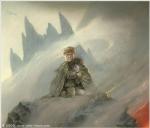 polishgenius, on 17 March 2016 - 05:23 PM, said:
polishgenius, on 17 March 2016 - 05:23 PM, said:
 QuickTidal, on 17 March 2016 - 03:51 PM, said:
QuickTidal, on 17 March 2016 - 03:51 PM, said:
For example, the Piri Reis map (created in the 14th century)...most academics will pretty much swear that the lower portions of it (which APPEAR to map Antarctica, including the definition of the coastline BEFORE it was covered in ice) is actually just a misinterpretation of the coast of South America made by Reis (or the sources he used)...whereas Hancock (based on his own research and others) comes to the idea that Antarctica (discovered in 1818) was possibly mapped thousands of years prior and was in a continental position that allowed it to be less covered in ice at the time (prior to the Drake Passage existing). The idea that sourced maps could exist with the world looking like it was BEFORE we thought things WERE mapped...is an abhorrent conclusion to most scholars. Is it probable? Eh...I just come down on the line that history isn't and never should be "set". It's in flux as we learn and grow and study...and since we learn new things all the time that question our written history.
I'm curious to know what you/he mean by this. I'm not enough of a historian to be at all able to have an opinion on his ideas on those fronts, I'd have to read the books to have even a vague chance, but I understand enough about plate tectonics and geology to know that the claim that Antarctica was, within a human timeline, far enough away from where it is now to have a significantly different climate to be almost as wild as the idea of aliens. Even if such a big move in so short a time were possible, which I'm pretty sure it's not, it would have left evidence in the surrounding area, and it would likely have caused worldwide effects that would have been in the historical record as various strange devastations. Hey, maybe it's what caused worldwide flood myths - but again, that would require some pretty strong evidence before it's anything but a wild theory.
I could buy the idea that the earth was at some point warm enough that Antarctica wasn't completely iced up - I'd have thought it would have been spotted by now by the traces it left too but it's not inconceivable to me that there was something equivalent to the Roman Warm Period at some stage - but joined on to Brazil? Unlikely.
His point is that the "within a human timeline" as we know it could be somewhat mistaken. Flood/disaster myths that line up with recent findings of some kind of cataclysm around 12,800 years ago (this is prior to the known establishment of human civilization in the cradle of Civ). He posits that humans had progressed PRIOR to when we thought we did (12,000 years back)...but upheaval destroyed most of it, leaving only remnants. I don't think the implication is that Antarctica was tropical or anything, just that it was less ice covered in a time when that could have been measured coastline-wise. F
urther and more accurate studies have proven that the last period of ice-free condition in the Antarctic ended about 6000 years ago. There are still doubts about the beginning of this ice-free period, which has been put by different researchers everything between year 13000 and 9000 BC. Think about how close the northern edge of Greenland (for example) is to the Arctic Circle...and though ice and snow fills a lot of the interior...the coasts are relatively free of it. I think that's the implication. Not a massive difference (AKA not when it would have been covered in forests millions of years ago, just long enough ago that cartographers (from an early civ) might have mapped it while it was in a state where the coast was map-able. Again, it's not rock solid or anything, but I'm happy to entertain it as a possibility. Lastly, there are other maps he presents (latter maps, some of which were made by well known and respected cartographers) which elude to similar things. I should note that this is not something that can be looked at by itself, lots of factors and theories are involved (it's a nearly 500page book), and in singling it out I'm not doing the author any favors.
But as to his lost civilization theory that permeates this book and others...with the discovery of Goblekli Tepi and Gunung Padang (both obviously full-on civilizations of humans...LONG beofre historians say such things could have existed) basically shutting down the LONG held historical belief that during the era they were built humans were hunter gatherer nomads...and yet a decade ago you'd have been laughed out of academia to suggest such a travesty. I just think nothing is out of the realm of possibility.
Final note: If it's all bollocks in the end (and I don't believe it can be dismissed as such), I really don't mind as it's an enthralling book....theories accurate or not.
EDIT: I forgot this part. Apparently, Einstein supported the theory (Back when it was presented by Hapgood) and found it had merit. That's a pretty big feather in the cap if you ask me.
This post has been edited by QuickTidal: 17 March 2016 - 06:31 PM
"When the last tree has fallen, and the rivers are poisoned, you cannot eat money, oh no." ~Aurora
"Someone will always try to sell you despair, just so they don't feel alone." ~Ursula Vernon
 QuickTidal, on 17 March 2016 - 03:51 PM, said:
QuickTidal, on 17 March 2016 - 03:51 PM, said:
 Help
Help



















